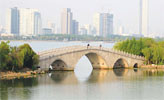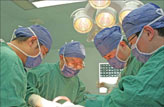Asia
China resumes tourism to Japan after quake
Updated: 2011-05-18 16:55
(Xinhua)
SHANGHAI - A group of 180 Chinese tourists will take a chartered plane from Shanghai to Japan on June 2. Their trip to the country marks the start of the recovery of China-Japan tourism since Japan's March 11 earthquake and tsunami.
| ||||
China's National Tourism Administration issued warnings to Chinese tourists after the massive earthquake, saying that tourists should be "prudent" about their travel choices and should avoid traveling to disaster-struck areas. Tourism from China to Japan has stagnated since then.
On April 29, the administration posted a new notice on its website, saying that Japan had begun post-disaster reconstruction and that most of the country, with the exception of the area surrounding the damaged Fukushima nuclear power plant, was safe to visit.
The notice stated that Chinese tourists intending to go to Japan should take care to educate themselves about disaster safety and should pay attention to relevant information posted by Japanese authorities.
Just two weeks later, a three-day international tourism expo held in Shanghai allowed a dozen Japanese travel agencies to do their best to win back the trust of Chinese tourists.
According to Kawamata Toshiro, chief representative of the Shanghai office of Japan's Ibaraki Prefectural Government, Japan is known to be a relatively safe place for tourists.
"We hope that tourists know that Ibaraki is a safe place. Tourists are welcome to visit our prefecture," he said.
Now, after two months of stagnation, tourism from China to Japan is finally beginning to recover.
Shanghai's Jinjiang Travel Agency has been arranging for groups of tourists to visit the country in June. The Shanghai branches of the China International Travel Service and the China Travel Service plan to organize trips to Japan in July.
According to Zou Qingling, vice general manager of the Asia-Pacific department of the Spring and Autumn travel agency, the region of Kansai was not badly damaged by the earthquake and tsunami, making it safe for travel.
The agency's Kagawa-Osaka-Kobe-Nara itinerary is just one of several new itineraries being offered by the company since the disaster.
He Zhaolai, a retiree from Shanghai's Yangpu District, plans to take a trip to Japan with his wife in late June.
"I've learned that areas around Osaka were scarcely affected by the quake. It's worth going there in June, when the weather is nicer. The price for the trip is also quite good," he said.
However, some prospective tourists are still worried about the possibility of being exposed to dangerous levels of radiation.
Zhou Qi, a white-collar worker who has decided to go to the Republic of Korea for her honeymoon in early July, said that even though she enjoys Japan, she chose the ROK for her honeymoon because she is worried about the chance of being exposed to radioactive material.
Although several travel agencies in the Chinese cities of Guangdong and Beijing have resumed booking trips to Japan, their prices have been significantly slashed to convince would-be travellers.
Liang Shaokuan, manager of the Xiaolan office of Guangdong's China International Travel Service, said that itineraries should be designed carefully to avoid areas that have been severely impacted by the quake. These "safe" itineraries will be much more acceptable for prospective tourists, Liang said.
E-paper

Green works
Wuxi becomes 'test case' for facing country's environmental challenges
Preview of the coming issue
The global rise of Chinese brands
China-EU trade on solid ground
Specials

The song dynasty
There are MORE THAN 300 types of Chinese operas but two POPULAR varieties are major standouts

Cut above the rest
One of the world's oldest surgeons has performed more than 14,000 operations

From the ground up
Architect of Guangzhou Opera House has many projects under way, including 2012 Olympics.

